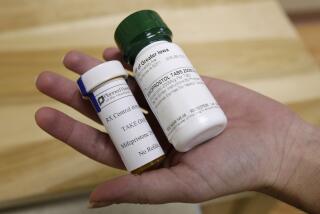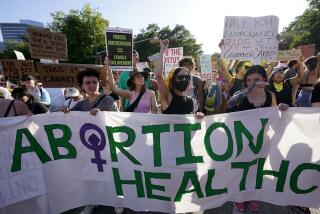A new day for the morning-after pill
The 40 studies were thorough and conclusive: The morning-after contraceptive pill is safe and effective, and teenage girls understand just as much as young women do about how to use it safely. Also well studied were the Bush administration’s attempts to keep the pill out of the hands of American women and girls, at least for as long as it could. The conclusion, just as clear, in a 2005 report by the Government Accountability Office: The Food and Drug Administration abdicated its duty, overriding and overruling scientists so that it could delay and limit access to the pill and thus allay the concerns of religious conservatives.
A federal court ruling this week spared no criticism of the FDA, saying that the agency’s reason for limiting behind-the-counter sales of the pill to women 18 or older and to minors with a prescription “lacks all credibility” and was politically motivated. Perhaps most scathing was the court’s order to the FDA: Go back and reexamine the issue solely on its scientific merits. Within 30 days, the FDA also must make the pill available to 17-year-olds without a prescription.
The FDA stalled for years with subterfuges that were all too transparent. First it rejected nonprescription use of the pill, which was marketed as Plan B. Then it told the manufacturer, Barr Laboratories, to submit a proposal for allowing the pill for older teens and adults. Once the company did so, the FDA said it wasn’t sure that limiting use by age was valid. Finally, in 2006, the agency decided to give women 18 and older behind-the-counter access -- but only as a sop to senators who were threatening to hold up President Bush’s nomination of Andrew C. von Eschenbach as FDA commissioner.
The campaign to make Plan B available without a prescription was based on solid medical grounds: The pill is most effective when used within 24 hours of intercourse. The response of the FDA, which the public relies on to make equally solid medical decisions, was an embarrassing new low that prompted the agency’s director of women’s health to resign. Objections that the pill would entice girls into earlier and more promiscuous sex were not only unfounded -- among the studies were findings that access to Plan B did not affect sexual behavior -- but irrelevant. It was never part of the FDA’s job to monitor moral behavior among adolescents.
There is justified glee in the scientific community over the announcement by President Obama that science will be shown due respect under his administration. As welcome as this new direction is, the court’s review of the FDA’s actions provides an even more significant reassurance that the government will be held to account no matter who is in power at the moment.
More to Read
A cure for the common opinion
Get thought-provoking perspectives with our weekly newsletter.
You may occasionally receive promotional content from the Los Angeles Times.










